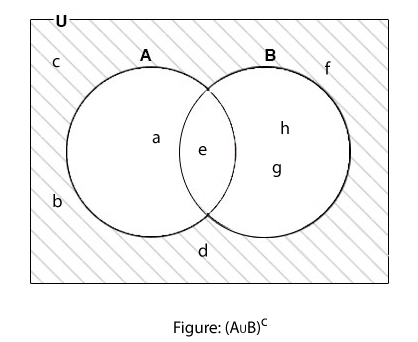Suppose we have a set A which is a subset of some Universal Set “U”. The complement of A is a set of elements of the Universal Set, which are not the elements of A.
Here, Set A’ complement is estimated w.r.t Universal Set ( Taking everything in mind, Set A refers to a subset of Universal Set, U). This very type of complement is referred to as the Absolute Complement.
If Universal Set is given by U and any subset of U is given by A then A’s complement is the set of all elements of Universal Set “U”, which are not A’s elements.
A′ = { x : x ∈ U and x ∉ A }
As an alternative, it can be mentioned that the difference between subset A and Universal Set U provides us Set A’s complement.
Example
Now, Find complement of Set A and Set B plus the intersection of both complemented sets.
Answer: The Universal Set is determined as:
U = { 1, 2, 3, 4, 5, 6, 7, 8, 9, 10, 11, 12, 13, 14, 15 }
Also, A = { 2,8,12 }; B = { 7,11,13,15 }
Set A’s complement is described as:
A′ = { x : x ∈ U and x ∉ A }
Hence,
A′ = { 1, 3, 4, 5, 6, 7, 9, 10, 11, 13, 14, 15 }
Similarly, Set B’s complement
B’ = { 1, 2, 3, 4, 5, 6, 8, 9, 10, 12, 14,}
The intersection of both sets which are complemented, it’s given by:
A′∩B′⇒ A′∩B′ = { 1, 2, 3, 4, 5, 6, 7, 8, 9, 10, 11, 12, 13, 14, 15 }
Thus, we can observe that from the above discussions, if a set A is the subset of Universal Set U, then complement of set A, that is, A′ is a subset of U also.
Also, there are different methods for identifying the complement with the use of notation. For example, the main mark can be used. Occasionally, “c”, the lower superscripted case is used.
Example:
Taking, Complement of Union of Set
If U = { a, b, c, d, e, f, g, h }; A∪B = {a, e, g, h}, find (A∪B)c.
Here,
U = {a, b, c, d, e, f, g, h}
A∪B = { a, e, g, h }
(A∪B) c = U – (A∪B)
∴ (A∪B) c = { b, c, d, f }
C = complement

